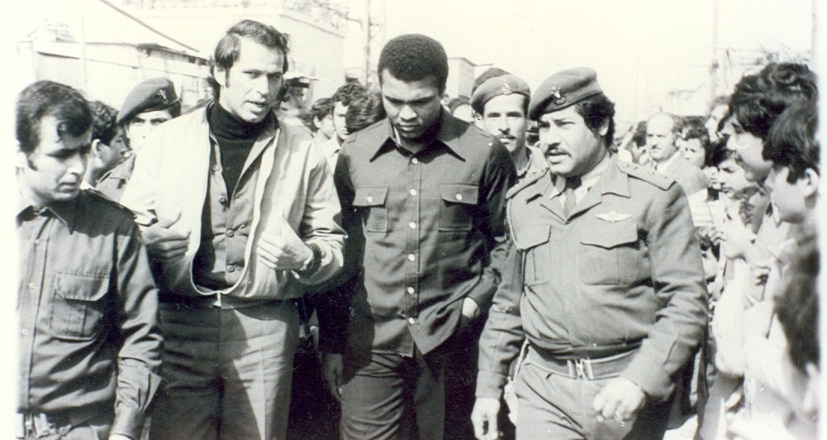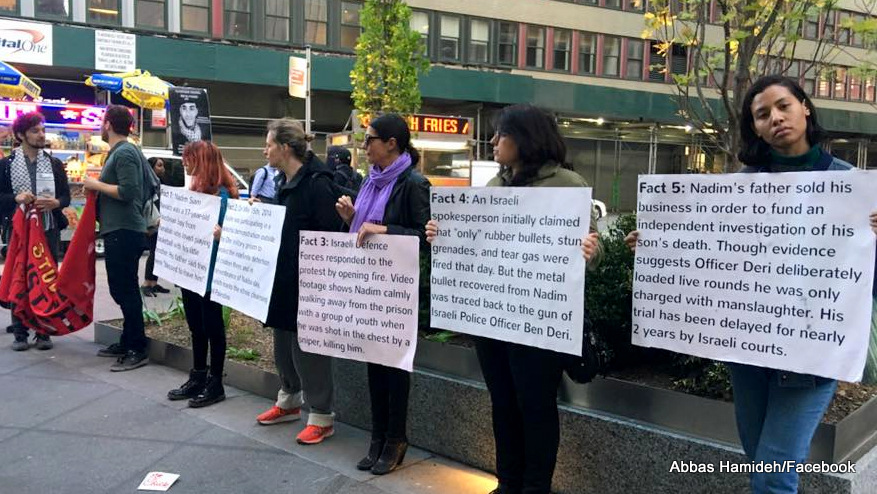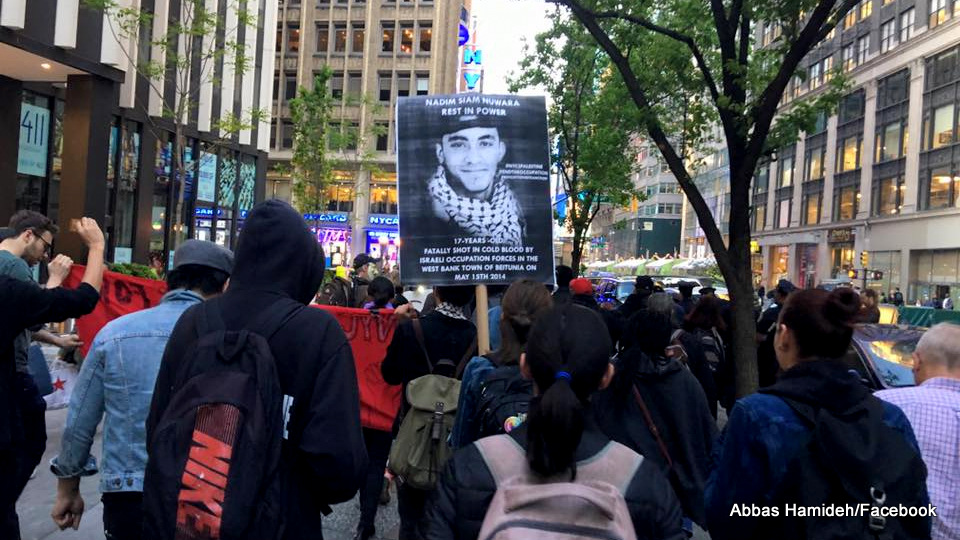
NEW YORK — Legendary boxer, Islamic missionary, outspoken social commentator and activist Muhammad Ali leaves behind a legacy of forging ties between black and Palestinian struggles that, both movements say, continues to grow.
Aside from his athletic prowess as the world’s only three-time lineal heavyweight boxing champion, many today remember him for his strong opposition to the Vietnam War and his refusal to participate in the military draft.
“The real enemy of my people is right here,” Ali famously said in response to his 1967 draft notice. “I will not disgrace my religion, my people or myself by becoming a tool to enslave those who are fighting for their own justice, freedom and equality,”
“I have nothing to lose by standing up for my beliefs. So I’ll go to jail. We’ve been in jail for four hundred years.”
In response to Ali’s refusal to accept induction into the U.S. Armed Forces, the New York State Athletic Commission suspended his boxing license and the World Boxing Association revoked his title the same day.
After 21 minutes of deliberation by an all-white jury, a U.S. District Court in Houston sentenced him to five years in prison and a $10,000 fine, the maximum penalty for draft refusal.
Only after lengthy appeals did the U.S. Supreme Court unanimously acquit Ali in 1971, ruling that his religious claim for conscientious objection was valid, as his “beliefs are founded on the tenets of the Muslim religion as he understands them.”
‘I declare support for the Palestinian struggle’’
But Ali’s international solidarity was broad and comprehensive, often leading him to many distant corners of the world.
In March 1974, as the final year of war raged in Vietnam, Ali toured the Middle East, telling a press conference in Beirut, “The United States is the stronghold of Zionism and imperialism.”
Later, while visiting two Palestinian refugee camps in southern Lebanon, he said, “In my name and the name of all Muslims in America, I declare support for the Palestinian struggle to liberate their homeland and oust the Zionist invaders.”
Palestine mourns Muhammad Ali. "I declare my support for the Palestinian struggle," Muhammad Ali.
#RIPMuhammadAli pic.twitter.com/A0ogYAxK2i— Palestine Info Center (@palinfoen) June 4, 2016
In June 1985, Ali traveled to Israel, hoping to press government officials for the release of 700 Lebanese and Palestinian prisoners captured by occupation forces.
Over the following years, as the first Palestinian Intifada erupted, he joined demonstrations supporting it in the United States.
From "Muhammad Ali Handbook" (now out of print) Muhammad Ali at a 1988 Chicago demo for Palestinian human rights. pic.twitter.com/BDStnkhjM6
— Dave Zirin (@EdgeofSports) June 4, 2016
As Parkinson’s disease took its toll on Ali, his health ebbed and his public activities dwindled.
Although he died on June 3, it’s clear that his legacy of solidarity across borders and causes will persevere.
‘Shut it down’
On May 16, a day after hundreds of demonstrators marched across the Brooklyn Bridge to commemorate 68 years of the Palestinian Nakba last month, more gathered in Manhattan.
This protest, like many before it, was one of a series organized weekly by NYC Shut It Down, a local affiliate of the Black Lives Matter movement, for over a year. Typically, the demonstrations highlight the killings of black Americans by police forces in the U.S.
As a line of participants held signs describing these deaths, others shouted their contents in an Occupy Wall Street-inspired “mic check.”
The gatherings usually culminate in noisy marches through nearby streets, and are often targeted by police for arrests.
But while many of these elements remained the same on May 16, the protesters’ focus was different, if familiar.
That week, the demonstration had been dedicated to Nadeem Nawarah, a 17-year-old Palestinian killed by Israel.
‘The Israeli army used live fire’
Along with 16-year-old Mohammad Abu Daher, Nadeem Nawarah was shot and killed by Israeli forces outside Israel’s Ofer prison in the Occupied West Bank town of Beitunia during a Nakba Day protest on May 15, 2014.
Several hundred Palestinians had gathered outside the prison in a show of solidarity with Palestinian administrative detainees on a mass hunger strike against their indefinite imprisonment without charge or trial.
Ahmad Badwan of the Palestinian Medical Relief Committee told The New York Times the protest had “began peacefully,” then “turned into violence when the Israeli Army used live fire to disperse stone throwers.”
Like the separate shooting that killed Mohammed about an hour later, Nawarah’s death was captured by a closed-circuit television camera.
 The images quickly spread worldwide, sparking outrage and demands for accountability.
The images quickly spread worldwide, sparking outrage and demands for accountability.
Many Palestinian observers consider the deaths the start of a series of Israeli attacks that included a massive military operation in the West Bank before culminating in a 51-day bombardment of the Gaza Strip.
‘This was a murder’
Nawarah’s father, Siam, ultimately sold his business in the West Bank and travelled to the U.S., hoping to pursue justice for his son.
Among other events, he appeared in Ferguson, Missouri, during commemorations of the one-year anniversary of the 2014 uprising.
In November 2014, Ben Deri, the Israeli Border Police officer implicated in his son’s death, was indicted on charges of manslaughter.
“In my mind, this was a murder and the policeman should be facing a murder charge, with the possibility of receiving a life sentence,” Siam told the Institute for Middle East Understanding.
“A Palestinian arrested under these circumstances would be facing murder charges, with the possibility of life imprisonment, and his family’s home would be demolished.”
Despite the laxity of Deri’s charge, his was the only indictment to result from the killings of 62 Palestinian children by Israeli forces in the West Bank since January 2014.
But a year and a half later, his case seems no closer to its end.

“I think the Israeli government wants the case dropped, so they keep coming up with excuses to put it off,” Siam told Al-Jazeera in April.
“It has been two years, and I am no closer to getting justice for my son’s death than I was when he was killed.”
‘An amazing show of solidarity’
The New York demonstration was “an amazing show of solidarity between the Black Lives Matter Movement and the Palestinian struggle,” Abbas Hamideh, co-chair of Al-Awda: The Palestine Right to Return Coalition, told MintPress News.
Even before Muhammad Ali’s visit to Lebanon, black and Palestinian activists often supported each other, building relationships that sometimes stretch back decades.
A decade earlier, Malcolm X visited Gaza for two days in September 1964, touring refugee camps, praying in a local mosque and holding a press conference in the parliament building.
After meeting with Ahmad Shukeiri, the first chairman of the Palestine Liberation Organization, X wrote his famous denunciation of Israeli settler-colonialism, “Zionist Logic,” for The Egyptian Gazette.
At the height of the Black Power movement, the Black Panther Party forged connections with the Palestine Liberation Organization, and even had a small membership among Palestine’s black population.
Decades later, after Israel’s 2008-2009 military offensive against the Gaza Strip, Malcolm X Grassroots Movement members joined a “Viva Palestina” convoy, successfully challenging Egypt’s participation in the closure of Gaza.
These ties gained new potency during the summer of 2014, when the city of Ferguson erupted in protest over a police officer’s killing of Michael Brown on Aug. 9, during a ceasefire in Israel’s military offensive against the Gaza Strip.
In cities across the U.S., simultaneous demonstrations in support of Ferguson and Gaza melded together, their participants finding common cause.
Over the following months, the two movements continued to interact. As supporters of Palestine organized contingents in massive demonstrations against police violence, black activists and supporters joined protests and campaigns against the Israeli occupation of Palestine.
But NYC Shut It Down’s protest marked a rare occasion when one movement organized its own event in support of the other.
‘Hyper-incarcerated and summarily executed’
“Like black people and other people of color in the U.S., Palestinians are hyper-incarcerated and summarily executed by the state in their heavily policed communities,” Johanna Fernandez, a history professor at the City University of New York’s Baruch College and a coordinator of the Campaign to Bring Mumia Home and Educators for Mumia Abu-Jamal, told MintPress.
Earlier this year, Fernandez participated in a ten-day delegation that visited Palestinian communities in Israel and the West Bank along with other faculty, former Black Panther Party members and U.S.-held political prisoners, and anti-prison and labor union activists.
The group’s meetings with Palestinians, as well as a statement released after its return on April 17, Palestinian Prisoners’ Day, focused on the commonalities between political imprisonment and other forms of repression in both Palestine and the U.S.
“Systems of oppression are global and we need to understand them in order to win,” Fernandez said. “But also, recognizing our common experiences of oppression across borders, and seeing others stand up against our suffering, is a very emotional and beautiful thing that restores our humanity and strengthens our resolve to continue to fight with dignity.”
Since Ferguson and the 2014 Gaza offensive, these connections have expanded at an unprecedented rate, Al-Awda’s Hamideh said.
“This bond between the oppressed communities is definitely growing like never before, and it will naturally continue to grow.”

